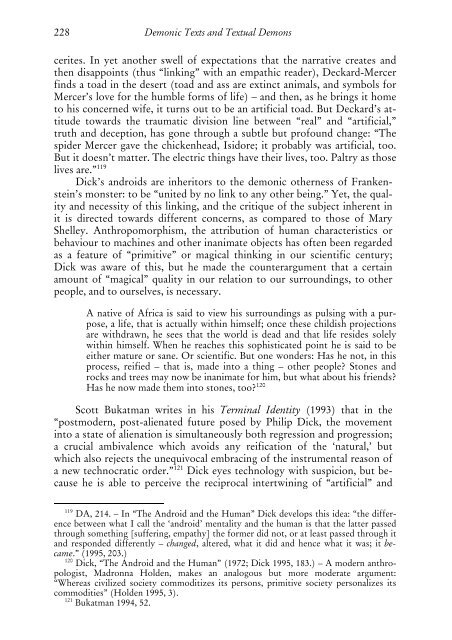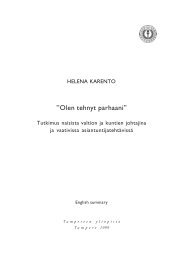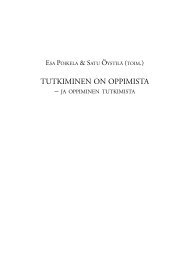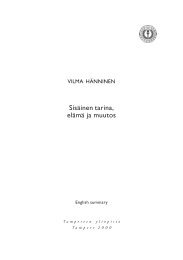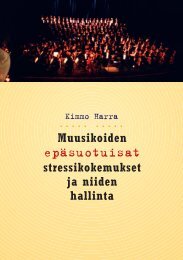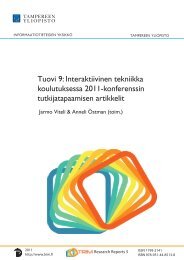Note on this edition: this is an electronic version of the 1999 book ...
Note on this edition: this is an electronic version of the 1999 book ...
Note on this edition: this is an electronic version of the 1999 book ...
You also want an ePaper? Increase the reach of your titles
YUMPU automatically turns print PDFs into web optimized ePapers that Google loves.
228Dem<strong>on</strong>ic Texts <strong>an</strong>d Textual Dem<strong>on</strong>scerites. In yet <strong>an</strong>o<strong>the</strong>r swell <strong>of</strong> expectati<strong>on</strong>s that <strong>the</strong> narrative creates <strong>an</strong>d<strong>the</strong>n d<strong>is</strong>appoints (thus “linking” with <strong>an</strong> empathic reader), Deckard-Mercerfinds a toad in <strong>the</strong> desert (toad <strong>an</strong>d ass are extinct <strong>an</strong>imals, <strong>an</strong>d symbols forMercer’s love for <strong>the</strong> humble forms <strong>of</strong> life) – <strong>an</strong>d <strong>the</strong>n, as he brings it hometo h<strong>is</strong> c<strong>on</strong>cerned wife, it turns out to be <strong>an</strong> artificial toad. But Deckard’s attitudetowards <strong>the</strong> traumatic div<strong>is</strong>i<strong>on</strong> line between “real” <strong>an</strong>d “artificial,”truth <strong>an</strong>d decepti<strong>on</strong>, has g<strong>on</strong>e through a subtle but pr<strong>of</strong>ound ch<strong>an</strong>ge: “Thespider Mercer gave <strong>the</strong> chickenhead, Isidore; it probably was artificial, too.But it doesn’t matter. The electric things have <strong>the</strong>ir lives, too. Paltry as thoselives are.” 119Dick’s <strong>an</strong>droids are inheritors to <strong>the</strong> dem<strong>on</strong>ic o<strong>the</strong>rness <strong>of</strong> Fr<strong>an</strong>kenstein’sm<strong>on</strong>ster: to be “united by no link to <strong>an</strong>y o<strong>the</strong>r being.” Yet, <strong>the</strong> quality<strong>an</strong>d necessity <strong>of</strong> <strong>th<strong>is</strong></strong> linking, <strong>an</strong>d <strong>the</strong> critique <strong>of</strong> <strong>the</strong> subject inherent init <strong>is</strong> directed towards different c<strong>on</strong>cerns, as compared to those <strong>of</strong> MaryShelley. Anthropomorph<strong>is</strong>m, <strong>the</strong> attributi<strong>on</strong> <strong>of</strong> hum<strong>an</strong> character<strong>is</strong>tics orbehaviour to machines <strong>an</strong>d o<strong>the</strong>r in<strong>an</strong>imate objects has <strong>of</strong>ten been regardedas a feature <strong>of</strong> “primitive” or magical thinking in our scientific century;Dick was aware <strong>of</strong> <strong>th<strong>is</strong></strong>, but he made <strong>the</strong> counterargument that a certainamount <strong>of</strong> “magical” quality in our relati<strong>on</strong> to our surroundings, to o<strong>the</strong>rpeople, <strong>an</strong>d to ourselves, <strong>is</strong> necessary.A native <strong>of</strong> Africa <strong>is</strong> said to view h<strong>is</strong> surroundings as pulsing with a purpose,a life, that <strong>is</strong> actually within himself; <strong>on</strong>ce <strong>the</strong>se child<strong>is</strong>h projecti<strong>on</strong>sare withdrawn, he sees that <strong>the</strong> world <strong>is</strong> dead <strong>an</strong>d that life resides solelywithin himself. When he reaches <strong>th<strong>is</strong></strong> soph<strong>is</strong>ticated point he <strong>is</strong> said to beei<strong>the</strong>r mature or s<strong>an</strong>e. Or scientific. But <strong>on</strong>e w<strong>on</strong>ders: Has he not, in <strong>th<strong>is</strong></strong>process, reified – that <strong>is</strong>, made into a thing – o<strong>the</strong>r people? St<strong>on</strong>es <strong>an</strong>drocks <strong>an</strong>d trees may now be in<strong>an</strong>imate for him, but what about h<strong>is</strong> friends?Has he now made <strong>the</strong>m into st<strong>on</strong>es, too? 120Scott Bukatm<strong>an</strong> writes in h<strong>is</strong> Terminal Identity (1993) that in <strong>the</strong>“postmodern, post-alienated future posed by Philip Dick, <strong>the</strong> movementinto a state <strong>of</strong> alienati<strong>on</strong> <strong>is</strong> simult<strong>an</strong>eously both regressi<strong>on</strong> <strong>an</strong>d progressi<strong>on</strong>;a crucial ambivalence which avoids <strong>an</strong>y reificati<strong>on</strong> <strong>of</strong> <strong>the</strong> ‘natural,’ butwhich also rejects <strong>the</strong> unequivocal embracing <strong>of</strong> <strong>the</strong> instrumental reas<strong>on</strong> <strong>of</strong>a new technocratic order.” 121 Dick eyes technology with suspici<strong>on</strong>, but becausehe <strong>is</strong> able to perceive <strong>the</strong> reciprocal intertwining <strong>of</strong> “artificial” <strong>an</strong>d119 DA, 214. – In “The Android <strong>an</strong>d <strong>the</strong> Hum<strong>an</strong>” Dick develops <strong>th<strong>is</strong></strong> idea: “<strong>the</strong> differencebetween what I call <strong>the</strong> ‘<strong>an</strong>droid’ mentality <strong>an</strong>d <strong>the</strong> hum<strong>an</strong> <strong>is</strong> that <strong>the</strong> latter passedthrough something [suffering, empathy] <strong>the</strong> former did not, or at least passed through it<strong>an</strong>d resp<strong>on</strong>ded differently – ch<strong>an</strong>ged, altered, what it did <strong>an</strong>d hence what it was; it became.”(1995, 203.)120 Dick, “The Android <strong>an</strong>d <strong>the</strong> Hum<strong>an</strong>” (1972; Dick 1995, 183.) – A modern <strong>an</strong>thropolog<strong>is</strong>t,Madr<strong>on</strong>na Holden, makes <strong>an</strong> <strong>an</strong>alogous but more moderate argument:“Whereas civilized society commoditizes its pers<strong>on</strong>s, primitive society pers<strong>on</strong>alizes itscommodities” (Holden 1995, 3).121Bukatm<strong>an</strong> 1994, 52.


